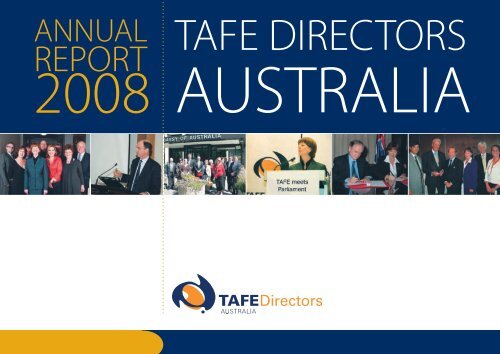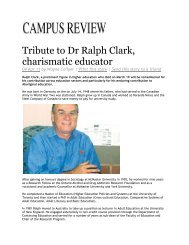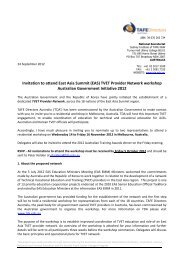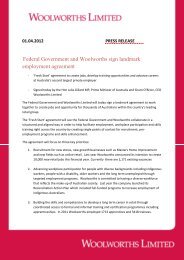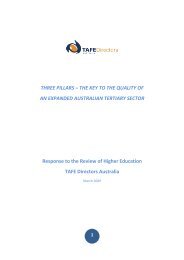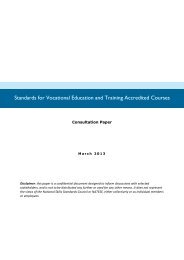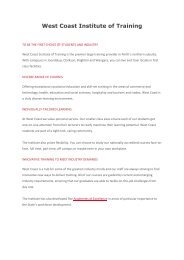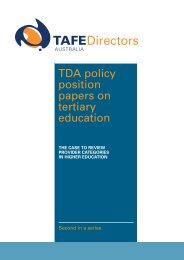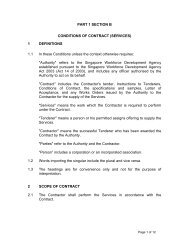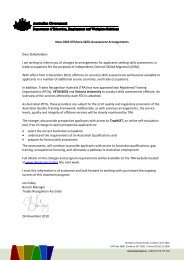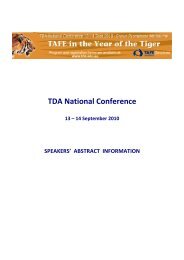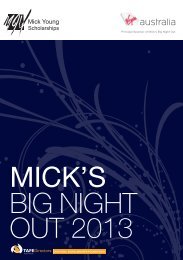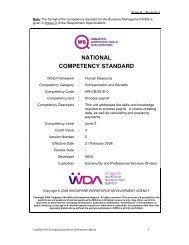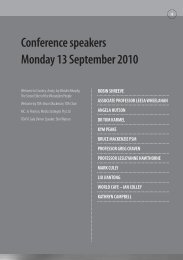REPORT - TAFE Directors Australia
REPORT - TAFE Directors Australia
REPORT - TAFE Directors Australia
Create successful ePaper yourself
Turn your PDF publications into a flip-book with our unique Google optimized e-Paper software.
ANNUAL<br />
<strong>REPORT</strong><br />
2008<br />
<strong>TAFE</strong> DIRECTORS<br />
AUSTRALIA
<strong>TAFE</strong> <strong>Directors</strong> <strong>Australia</strong> Inc.<br />
Location<br />
CIT Southside Campus<br />
Ainsworth Street<br />
PHILLIP ACT 2606<br />
Postal<br />
TDA National Secretariat<br />
GPO Box 826<br />
CANBERRA ACT 2601<br />
Contacts<br />
Telephone +61 2 6205 4600<br />
Facsimile +61 2 6205 1288<br />
Website www.tda.edu.au
ABOUT US<br />
<strong>TAFE</strong> <strong>Directors</strong> <strong>Australia</strong> (Inc) is the peak body<br />
representing <strong>Australia</strong>’s educational network of <strong>TAFE</strong><br />
Institutes, and includes universities of technology and<br />
institutes of technology.<br />
<strong>TAFE</strong> <strong>Directors</strong> <strong>Australia</strong> (TDA) celebrated its 10th<br />
anniversary of incorporation in 2008, and represents<br />
58 <strong>TAFE</strong> Institutes, the <strong>Australia</strong>n Pacific Technical<br />
College, and associate members include corporate and<br />
individuals – especially including those Institutes and<br />
universities collaborating across international<br />
VET interests.<br />
TDA operates a National Secretariat, based at Canberra<br />
Institute of Technology, and manages an active<br />
website www.tda.edu.au – a communication link with<br />
some 7,000 “hits” weekly from members, and wider<br />
stakeholder interests.<br />
Contents<br />
NATIONAL BOARD 2<br />
MESSAGE FROM THE CHAIR 3<br />
CHIEF EXECUTIVE OFFICER’S <strong>REPORT</strong> 4<br />
OUR VISION 4<br />
OPERATION HIGHLIGHTS 5<br />
FINANCIAL <strong>REPORT</strong> 13<br />
1<br />
ANNUAL <strong>REPORT</strong> 2008
NATIONAL BOARD<br />
Executive<br />
Deb Daly, Chair, Institute Director, Gold Coast<br />
Institute of <strong>TAFE</strong> (Qld)<br />
Bruce Mackenzie, Deputy Chair, CEO,<br />
Holmesglen Institute of <strong>TAFE</strong> (Vic)<br />
Wayne Collyer, Deputy Chair, Director, Swan<br />
<strong>TAFE</strong> (WA)<br />
Members<br />
Aaron Devine, Director of <strong>TAFE</strong>, Charles Darwin<br />
University (NT)<br />
Dr. Colin Adrian, CEO, Canberra Institute of<br />
Technology (ACT)<br />
Stephen Conway, Director, <strong>TAFE</strong> SA South (SA)*<br />
Pam Christie, Director, <strong>TAFE</strong> NSW – Sydney<br />
Institute<br />
Steve Ghost, CEO, SkillsTech <strong>Australia</strong> (Qld)<br />
Kevin Harris, Director, <strong>TAFE</strong> NSW – Northern<br />
Sydney Institute<br />
Belinda McLennan, CEO, Tasmanian<br />
Polytechnic (Tas)*<br />
Virginia Simmons, CEO, Chisholm Institute of<br />
<strong>TAFE</strong> (Vic)<br />
* NOTE – Stephen Conway replaced Martina<br />
Buckley, <strong>TAFE</strong> SA Regional, who retired from the<br />
Board effective December 2008, and Belinda<br />
McLennan replaced Malcolm White, following<br />
new institute arrangements under vocational<br />
education legislation in Tasmania.<br />
2<br />
<strong>TAFE</strong> DIRECTORS AUSTRALIA
MESSAGE FROM THE CHAIR<br />
The Year in Review was a proud one for<br />
<strong>TAFE</strong> <strong>Directors</strong> <strong>Australia</strong> particularly as 2008<br />
heralded our 10th anniversary – the ‘coming of<br />
age’ for TDA and its leadership role in <strong>Australia</strong>’s<br />
VET system.<br />
Our 10th anniversary celebrations included the<br />
inaugural <strong>TAFE</strong> MEETS PARLIAMENT event held<br />
at Parliament House in Canberra, in September.<br />
This event gave members many opportunities<br />
to engage with Ministers and Ministerial staff,<br />
other Members of Parliament and senior<br />
government bureaucrats. It provided an<br />
excellent showcase for <strong>TAFE</strong> across <strong>Australia</strong><br />
and included a dinner hosted by the Deputy<br />
Prime Minister in Old Parliament House.<br />
Other major achievements in 2008 included:<br />
• The launch of the TDA Tuition Assurance<br />
Scheme, enabling registered <strong>TAFE</strong><br />
Institutes to offer FEE HELP student loans.<br />
• Hosting of the Youth Summit in Tasmania<br />
resulting in recommendations for reforms<br />
to the VET in Schools program.<br />
• The signing of an MoU with the Chilean<br />
Government to provide English language<br />
and vocational training to up to 400<br />
Chilean students per year for up to five<br />
years.<br />
• The signing of a new MoU between TDA<br />
and China’s CEAIE, with Chinese teacher<br />
training in <strong>Australia</strong> likely from 2009.<br />
• Hosting of the National Provider<br />
Roundtable for the OECD Research<br />
Project commissioned by the <strong>Australia</strong>n<br />
Government.<br />
• Leadership of a sector response to the<br />
tertiary vision from the Bradley Review<br />
on Higher Education. The response<br />
incorporated a ‘Three Pillars’ foundation<br />
theme of competition and contestability,<br />
quality and social inclusion – a theme that<br />
appears to be gaining some leverage.<br />
The impact of the Global Financial Crisis also<br />
gave TDA many opportunities to provide input<br />
to governments on a range of issues including<br />
the prospect of thousands of apprenticeship<br />
and traineeship contracts being cancelled<br />
by employers impacted by the deteriorating<br />
economy. These discussions continue.<br />
In reviewing our achievements, I am reminded<br />
of the important leadership role our peak body<br />
now plays within the national training system<br />
and also of the strategic intent of TDA itself,<br />
to be the authoritative voice of the national<br />
training sector, delivering quality policy<br />
solutions to <strong>Australia</strong>’s skills needs.<br />
In our leadership role, we are represented on<br />
the National Quality Council, we are consulted<br />
regularly by Federal agencies including<br />
DEEWR, DIAC, DFAT and Department of<br />
Innovation Industry, Science and Research as<br />
well as Skills <strong>Australia</strong>, we work closely with<br />
the National Centre for Vocational Education<br />
Research (NCVER) and collaborate with<br />
<strong>Australia</strong>’s 11 Industry Skills Councils.<br />
Our membership now extends to all 58 <strong>TAFE</strong><br />
Institutes across <strong>Australia</strong>, the <strong>Australia</strong>n Pacific<br />
Technical College, and also includes associate<br />
members primarily managing international<br />
student business areas. Our Association seeks<br />
to effectively service the growing business<br />
needs and interests of our <strong>TAFE</strong> Institute<br />
members, and associate members.<br />
Two emerging policy issues climaxed the<br />
focus of the ‘education revolution’: The Deputy<br />
Prime Minister commissioned Emeritus<br />
Professor Denise Bradley AC, to head up the<br />
Review of Higher Education, which reported<br />
in November 2008, and Senator the Hon. Kim<br />
Carr, commissioned a team led by Dr. Terry<br />
Cutler to review <strong>Australia</strong>n innovation and<br />
research.<br />
Our responses to these reviews, including<br />
endorsement by the Federal Government<br />
of our ‘Three Pillars’ foundation which<br />
complemented key features of the Bradley<br />
vision for a tertiary sector, was a big win as we<br />
closed the year. <strong>TAFE</strong> Institutes will be required<br />
to step-up to support further the ‘participation’<br />
qualification targets adopted by the Federal<br />
Government.<br />
Other areas of activity during 2008 included:<br />
• At a strategic level, the Board established<br />
a dedicated Policy Committee in 2008<br />
to oversee major changes in VET policy<br />
reform, and with member consultation,<br />
have lifted capability by TDA to lead<br />
with informative statements and policy<br />
positions on VET issues – especially with<br />
a new incoming Federal Government,<br />
determined to pursue its ‘education<br />
revolution.’<br />
• The National Secretariat revamped its<br />
consultative group, <strong>Australia</strong>n <strong>TAFE</strong><br />
International Network (ATIN). ATIN<br />
held regular strategic meetings across<br />
interested <strong>TAFE</strong> Institute international<br />
management, commissioned research,<br />
and oversaw international engagement<br />
by TDA, including new Chile Technical<br />
Scholarships to <strong>Australia</strong>, and a new<br />
extended MoU with the China CEAIE<br />
exchange agency, for managers and<br />
teachers of respective institutions to share<br />
best practice.<br />
• At a financial level, the Board leveraged<br />
reserves to invest in establishment of the<br />
TDA Tuition Assurance Scheme (TAS),<br />
which required extensive legal and<br />
administrative arrangements, Ministerial<br />
approval, and establishment of a TAS<br />
Administrative Committee. While this<br />
impacted our Year-end result to go into<br />
deficit in 2008, this remains a long-term<br />
investment, and we anticipate recovery<br />
of our position through 2009–10. These<br />
investment issues remained a key focus for<br />
the Finance and Audit Committee of the<br />
Board, which also established improved<br />
financial reporting analysis of the growing<br />
projects and remit of TDA.<br />
The GFC presents <strong>Australia</strong> with economic<br />
uncertainty and consumer and business<br />
constraint. To ordinary <strong>Australia</strong>ns, the need to<br />
skill and re-skill will become more important<br />
in uncertain labour markets. Your Association<br />
– TDA – is well positioned to advocate for<br />
<strong>TAFE</strong> Institutes to lead in the delivery of quality<br />
vocational education and training services<br />
across <strong>Australia</strong>.<br />
In closing, I would like to acknowledge<br />
the efforts and contributions of my fellow<br />
Board members and also the outstanding<br />
contribution of our Chief Executive Officer,<br />
Martin Riordan, and his team.<br />
3<br />
ANNUAL <strong>REPORT</strong> 2008
CHIEF EXECUTIVE OFFICER’S <strong>REPORT</strong><br />
Financial year 2008<br />
was a year mixed with<br />
strong operations<br />
performances for <strong>TAFE</strong><br />
<strong>Directors</strong> <strong>Australia</strong><br />
(TDA), yet challenging<br />
financially. The decision<br />
to invest in launching<br />
a Tuition Assurance Scheme caused a deficit<br />
for a second year. The support from the Board<br />
to utilise reserves for wider member services<br />
has however met with an improved uptake in<br />
the facility, with the regulatory environment<br />
causing further demand for Tuition Assurance<br />
beyond <strong>TAFE</strong> Institutes. This response should<br />
return TDA to surplus by close of 2009.<br />
At an operations policy level, TDA pursued<br />
key elements of our Strategic Plan, to show<br />
a leadership voice on vocational education<br />
across the <strong>Australia</strong>n VET sector – with focus<br />
on initiating policy advice with the incoming<br />
Rudd Government’s ‘education revolution.’ The<br />
National Secretariat produced 10 significant<br />
policy submissions over seven months,<br />
with strategic impact. We were selected to<br />
host the visiting OECD benchmark review<br />
of <strong>Australia</strong>n VET providers, hosted along<br />
with the <strong>Australia</strong>n College of Educators a<br />
National Forum on Vocational Skills for Youth,<br />
created a new international executive network<br />
which has commissioned research, and led<br />
three overseas benchmark missions for <strong>TAFE</strong><br />
executives. Yet a highlight of the year remains<br />
in the first half, when a new ‘tertiary funding<br />
platform’ for infrastructure was achieved for<br />
<strong>TAFE</strong> Institutes, following our successful lobby<br />
for the Federal Budget 2008 to create the $11B<br />
Education Investment Fund – formerly the $6B<br />
Higher Education Endowment Fund which had<br />
been quarantined to universities.<br />
TDA member networks were active, too. The<br />
website www.tda.edu.au has grown to be<br />
a dominant channel for information across<br />
the VET/<strong>TAFE</strong> sector, scoring an average of<br />
9,740 individual visits a month – frequently<br />
20% international cyber visitors. The Monday<br />
national e-newsletter has become a hit, with<br />
subscriptions increasing every week!<br />
<strong>TAFE</strong> MEETS PARLIAMENT 2008 heralded a<br />
turning point in our events. In September, TDA<br />
launched the special two-day Canberra event<br />
for members, associates and international<br />
<strong>TAFE</strong> executives. This special event marked<br />
the Association’s 10th anniversary, which<br />
included a Parliamentary Dinner attended<br />
by the Deputy Prime Minister, Ministerial<br />
and Parliamentary colleagues. Evaluations<br />
reported wide approval of the network event,<br />
and attendance showed how <strong>TAFE</strong> <strong>Directors</strong><br />
<strong>Australia</strong> had increasingly achieved its quest to<br />
be the peak body representing <strong>Australia</strong>’s 58<br />
<strong>TAFE</strong> Institutes, and living up to expectations<br />
for policy leadership across key bodies, such as<br />
the National Quality Council, COAG and state<br />
and territory VET agencies, and aid agencies<br />
supporting our new member, the <strong>Australia</strong>n<br />
Pacific Technical College.<br />
For <strong>TAFE</strong> Institutes supporting international<br />
students or offshore activities, TDA created<br />
a holistic strategic push for quality, and was<br />
rewarded with favourable feedback from<br />
members and agencies. A highlight by midyear<br />
was selection of TDA to be invovled as<br />
signatory of a MoU between the Republic of<br />
Chile and TDA – along with similar Agreements<br />
with the Group of Eight and Universities<br />
<strong>Australia</strong> -- to receive BECAs CHILE scholarship<br />
students to <strong>Australia</strong> from 2009.<br />
We were also delighted to successfully<br />
negotiate a new and longer five-year MoU<br />
with China’s CEAIE peak body for teacher and<br />
student exchange. This will see immediate<br />
benefits, with the agency committing to<br />
extend to <strong>Australia</strong> its current teachers training<br />
operating in Germany and the USA.<br />
These policy initiatives, and increased member<br />
benefits, significantly satisfy an ambitious<br />
three-year Strategic Plan (2006-08), and with<br />
member input, TDA’s National Secretariat will<br />
take to our annual conference in 2009 what<br />
will shape as an updated Strategic Plan to<br />
guide the ‘next phase’ of development for the<br />
organisation.<br />
To each of our <strong>TAFE</strong> Institute member network,<br />
thank you for your contributions.<br />
To our TDA Board, particularly Chair Deb Daly,<br />
and Deputies Bruce Mackenzie and Wayne<br />
Collyer, I congratulate you on a year of great<br />
achievement.<br />
To all our TDA staff, thank you for your tireless<br />
work and efforts for the <strong>TAFE</strong> Institutes we<br />
support. We also acknowledge the outsourced<br />
contributors to our work: accounts and payroll,<br />
secretarial, design and printing agencies – our<br />
thanks.<br />
MARTIN RIORDAN<br />
Chief Executive Officer<br />
OUR VISION<br />
<strong>TAFE</strong>:<br />
<strong>Australia</strong>’s<br />
provider of<br />
choice in<br />
vocational<br />
education<br />
4<br />
<strong>TAFE</strong> DIRECTORS AUSTRALIA
OPERATION HIGHLIGHTS<br />
The Year in Review 2008 created a unique<br />
policy opportunity to ‘make a difference’ for<br />
<strong>TAFE</strong> Institutes – for many years a poor cousin<br />
in treatment by government, at the expense of<br />
equally deserving schools and universities. The<br />
incoming Rudd Government election pledge<br />
for an ‘education revolution’ brought fast and<br />
frequently furious action, sometimes however<br />
the outcomes to impact skill shortages and<br />
resources have been less than satisfactory.<br />
A key early initiative was the Review of Higher<br />
Education, outlining a more collaborative<br />
tertiary vision for higher and vocational<br />
education, and a better deal for students to<br />
achieve articulation. The regulation required,<br />
and detail for funding the system, were lacking<br />
in the Report, and these are among several<br />
issues which await further commissioning<br />
by the Deputy Prime Minister – especially<br />
demonstrating to the sector and consumers<br />
how a Federal-focused and controlled tertiary<br />
system would operate, and be adequately<br />
funded to achieve the internationally<br />
competitive industry supported by the Bradley<br />
Review.<br />
The pledge for an additional 450,000<br />
Productivity Places Program regrettably fell<br />
well short of lifting skill qualifications, with<br />
official tender data from 2008 showing just<br />
7% were placed at <strong>TAFE</strong> Institutes, and few<br />
qualifications achieved in skill shortage trade<br />
areas.<br />
This issue flagged the challenge for TDA<br />
and similar education agencies: bringing<br />
to account the use of additional monies for<br />
education, and how these should produce<br />
the lift in skills and quality so sought by<br />
the Government, Productivity Commission,<br />
Treasury, Federal DEEWR and not least, the<br />
OECD Benchmark Review of VET in <strong>Australia</strong>,<br />
published in November 2008.<br />
ADVOCACY<br />
To achieve its Strategic Plan for greater voice of<br />
<strong>TAFE</strong>, and effective leadership by TDA for the<br />
VET sector, key campaigns were:<br />
$11B EDUCATION INVESTMENT FUND –<br />
TDA intensified its representations in early<br />
2008, toward pushing for equal standing<br />
with universities for additional infrastructure<br />
funding for public tertiary providers.<br />
Specifically, TDA argued that the $6B Higher<br />
Education Investment Fund be widened to<br />
<strong>TAFE</strong> Institutes.<br />
TDA was delighted when the Federal<br />
Budget 2008 granted this request, with<br />
the establishment of the $11B Education<br />
Investment Fund. The EIF Fund created for<br />
the first time a new platform of infrastructure<br />
funding for <strong>TAFE</strong> Institutes. This was a<br />
substantial policy initiative, and the first round<br />
of EIF funding is likely to be announced in<br />
Budget 2009.<br />
Our representations remain that an eminent<br />
<strong>TAFE</strong>/VET identity will represent <strong>TAFE</strong> on the<br />
EIF Advisory Board.<br />
NATIONAL QUALITY COUNCIL – During<br />
2008, TDA maintained strong involvement in<br />
NQC activities, using a network of endorsed<br />
representatives to ensure attendance at the<br />
many Council and Standing Committee<br />
meetings throughout the year. This<br />
representation was as follows:<br />
National Quality Council meetings – Virginia<br />
Simmons, CEO Chisholm Institute of <strong>TAFE</strong> and<br />
TDA Board member.<br />
Training Packages Standing Committee –<br />
Allan Ballagh, Director <strong>TAFE</strong> RMIT University<br />
and TDA member.<br />
Quality Standing Committee and its Excellence<br />
Criteria Working Group – Virginia Simmons<br />
and Helen McNamara, Manager Strategic<br />
Planning, Chisholm Institute .<br />
VET Workforce Development Committee –<br />
Dr. Wanda Korndorffer, CEO <strong>TAFE</strong><br />
Development Centre in Victoria.<br />
In the course of the year, the NQC also<br />
established a joint committee with COAG<br />
to develop a draft policy framework and<br />
approaches for ensuring the VET system has<br />
the products required to respond to changing<br />
labour market demand for the skills needed by<br />
businesses, industry and individuals in the 21st<br />
century. Allan Ballagh also represented TDA<br />
on this joint committee.<br />
The predominance of Victorian representatives<br />
on the NQC and its committees is accounted<br />
for by the fact that all meetings take place in<br />
Victoria and this is agreed to be the most costeffective<br />
and efficient approach.<br />
TDA is one of two provider peak bodies<br />
represented on the NQC, the other being the<br />
<strong>Australia</strong>n Council for Private Education &<br />
Training (ACPET). Wherever possible, the two<br />
provider organisations cooperated to present<br />
the provider perspective. A review of NQC<br />
membership resulted in a reduction in the<br />
number of members (particularly State and<br />
Territory representatives), but the provider<br />
representation remained unchanged.<br />
The role of the Training Packages Standing<br />
Committee in 2008 was to ensure that<br />
improved and more timely processes operate<br />
for the development, review and endorsement<br />
of Training Packages; and to guide work on<br />
improving the design of Training Packages,<br />
qualifications and units of competency. This<br />
included ensuring the quality of processes<br />
leading to endorsement of Training Packages<br />
as well as initiatives relating to ensuring the<br />
flexibility and responsiveness of Training<br />
Packages to changing industry and client<br />
needs and workplace practices. The Training<br />
Packages Standing Committee had an<br />
extensive work program to achieve these<br />
goals.<br />
The Quality Standing Committee provided<br />
strategic oversight and guidance of projects<br />
in the NQC Work Plan related to quality<br />
within the national VET system. This included<br />
monitoring, review and implementation of the<br />
<strong>Australia</strong>n Quality Training Framework. Work in<br />
2008 focussed on the development of Quality<br />
Indicators including learner engagement,<br />
employer satisfaction and competency<br />
completion.<br />
The NQC Standing Committee on VET<br />
Workforce Development had two major<br />
roles: to oversee NQC Work Plan projects to<br />
develop the professional capability of the VET<br />
workforce; and to provide advice on strategic<br />
priorities for the National VET Professional<br />
Capability Building Program (formerly<br />
‘Reframing the Future‘). Major projects of the<br />
Standing Committee in 2008 included the<br />
development of a National VET Workforce<br />
Development Strategy and the Quality of<br />
Assessment Practices.<br />
Some projected changes to the operations<br />
of the NQC in 2009 may see the work of the<br />
Standing Committees proceed under different<br />
arrangements.<br />
5<br />
ANNUAL <strong>REPORT</strong> 2008
OPERATION HIGHLIGHTS<br />
TERTIARY VISION – CREATING DIVERSITY<br />
IN HIGHER AND VOCATIONAL EDUCATION<br />
<strong>TAFE</strong> <strong>Directors</strong> welcomed the Review of Higher<br />
Education, led by Emeritus Professor Denise<br />
Bradley AC, as a timely acknowledgement<br />
of the need for reform in tertiary education<br />
– a sector noted by the newly-formed<br />
Skills <strong>Australia</strong> as of vital importance to the<br />
productivity of the <strong>Australia</strong>n economy, the<br />
community and to the success of <strong>Australia</strong>’s<br />
third largest export industry.<br />
TDA incorporated the views of its members in<br />
its response to the Review, “Three Pillars – the<br />
Key to the Quality of an Expanded <strong>Australia</strong>n<br />
Tertiary Sector”.<br />
TDA argued in its response that <strong>TAFE</strong> institutes,<br />
as public providers of VET, are well positioned<br />
to make a significant contribution to the<br />
achievement of national participation targets,<br />
identified in the Review. The Review, however,<br />
in its examination of the ‘broad based tertiary<br />
education system’ did not adequately consider<br />
or describe the special role of the <strong>TAFE</strong> public<br />
provider in increasing labour participation or<br />
the breadth and complexity of the training<br />
sector.<br />
The TDA response was organised around the<br />
six key characteristics of an effective tertiary<br />
education and training system, identified by<br />
Bradley. While the focus in the Bradley Report<br />
is on structural relationships between the<br />
sectors, TDA argued for the removal of the<br />
ambiguity in the report about the meaning<br />
of the terms ‘tertiary education’ and ‘VET’ and<br />
for more consistent use of these terms in<br />
conjunction with ‘higher education’. In addition<br />
TDA argued for a common understanding of<br />
the elements required to ensure quality and<br />
GOAL<br />
ELEMENT FEATURES<br />
‘‘THREE PILLARS MODEL: QUALITY IN AN EXPANDED AUSTRALIAN TERTIARY SECTOR”<br />
National Education Attainment Targets & model in a contestable funding environment<br />
> Halve the proportion of <strong>Australia</strong>ns aged 20–64 without qualifications at Certificate<br />
III level and above between 2009 and 2020<br />
> Double the number of higher qualification completions (diploma and advanced<br />
diploma) between 2009 and 2020.<br />
COMPETITION AND<br />
CONTESTABILITY<br />
client driven / user choice /<br />
funding follows the student<br />
price competitiveness<br />
eligibility criteria for access<br />
to Government-funded<br />
places<br />
widely available and<br />
accessible information<br />
about products<br />
increased fees for higher<br />
level qualifications aligned<br />
to later earning capacity<br />
‘level playing field’ for all<br />
providers<br />
ICLs to facilitate growth at<br />
higher qualification levels<br />
Drive flexibility,<br />
responsiveanessand<br />
higher skill levels<br />
QUALITY<br />
training products that<br />
allow flexibilityand<br />
innovation<br />
multiple credit transfer<br />
options within a world-class<br />
qualifications and credit<br />
framework<br />
robust provider registration,<br />
regulation and auditing<br />
processes<br />
emphasis on continuous<br />
improvement rather than<br />
compliance<br />
transparent, accessible<br />
information on relative<br />
provider performance<br />
nationally consistent and<br />
benchmarked assessment<br />
highly skilled VET workforce<br />
Drive continuous<br />
improvement and<br />
public esteem for VET<br />
SOCIAL INCLUSION<br />
support for marginalised<br />
groups to engage in training<br />
e.g. refugees, humanitarian<br />
settlers, migrants<br />
fit-for purpose<br />
arrangements for<br />
indigenous students and<br />
communities<br />
recognition of the special<br />
needs of thin markets<br />
structural adjustment<br />
facilitated e.g. for<br />
unemployed or displaced<br />
workers<br />
concessions available at entry<br />
level and for specific target<br />
groups<br />
systematic data collection<br />
and analysis on VET<br />
participation by low socioeconomic<br />
groups<br />
repayment threshold for ICLs<br />
that provides incentives for<br />
participation in VET<br />
Drive access for the<br />
disadvantaged and<br />
disengaged<br />
how this relates to contestability and social<br />
inclusion.<br />
With a view to taking this further TDA’s<br />
response was presented from within a<br />
‘Three Pillars’ model. For the Bradley Review<br />
to be successful there would need to be<br />
a set of outcomes, particularly for <strong>TAFE</strong><br />
Institutes as public providers of VET, that are<br />
consistent with the TDA three pillars model<br />
of competition and contestability, quality and<br />
social inclusion.<br />
INTERNATIONAL POLICY – TDA proved<br />
a strong advocacy role in working with<br />
domestic and international governments<br />
in the development of international policy.<br />
Skilled migration continues to be a key driver<br />
for international student’s choices and TDA<br />
worked closely with members, DEEWR and<br />
DIAC in ensuring new policy changes are<br />
informed and evidence based. The onset of<br />
the Global Financial Crisis saw the <strong>Australia</strong>n<br />
Government respond with reductions across<br />
a range of migration programmes, including<br />
skilled migration. TDA supported members<br />
with briefings regarding the changes, and<br />
put representations to government agencies<br />
arguing that any changes to the migration<br />
program consider the impact on current and<br />
future international students.<br />
During the year <strong>TAFE</strong> <strong>Directors</strong> gave<br />
evidence to the Joint Standing Committee<br />
on <strong>Australia</strong>’s Trade with APEC, with TDA and<br />
ATIN members highlighting the important<br />
work being conducted both within <strong>Australia</strong><br />
and in the region more broadly. TDA was a<br />
regular contributor to Free Trade Negotiations<br />
including important agreements with China<br />
and India. <strong>TAFE</strong> <strong>Directors</strong> also gave evidence<br />
6<br />
<strong>TAFE</strong> DIRECTORS AUSTRALIA
OPERATION HIGHLIGHTS<br />
TDA is represented on range of important<br />
industry boards including the International<br />
Education Association of <strong>Australia</strong>, the Council<br />
on <strong>Australia</strong> Latin America Relations (Education<br />
Advisory Group) and the Government Industry<br />
Stakeholder Committee.<br />
MEMBER SERVICES<br />
Twelve senior executives were part of the Canada/<br />
US TDA Mission, with the 2008 NAFSA Expo one<br />
highlight, in Washington<br />
on access to the China market to the House<br />
of Representatives Education and Training<br />
Committee, mainly outlining blockages to<br />
collaborative agreements which had arisen<br />
from apparent issues caused by private<br />
providers operating in the Greater China<br />
market. The Committee later questioned<br />
DEEWR on the issues, and is continuing with<br />
its enquiries.<br />
Over the past year TDA has led and supported<br />
missions to USA and Canada, China, South<br />
Korea and made preparations for the Kingdom<br />
of Saudi Arabia Mission in early 2009. Building<br />
the TDA brand and capability has paid<br />
dividends for the organisation with success in<br />
2008 in securing exclusive rights to support<br />
the Government of Chile BECAs Technical<br />
Scholarship program.<br />
TUITION ASSURANCE FOR ‘FEE-HELP’<br />
STUDENT LOANS – TDA invested significantly<br />
to establish a competitive Tuition Assurance<br />
Scheme for <strong>TAFE</strong> Institutes in 2008. ‘TDA<br />
TAS’ was developed as adjunct schemes for<br />
Institutes requiring higher and vocational<br />
education TAS certification, and these were<br />
both approved by the Deputy Prime Minister,<br />
and launched from 1 July 2008.<br />
The TDA TAS Scheme has been widely<br />
acknowledged by members, and some<br />
21 members joined by year’s end. Some<br />
limitation of the scheme was caused by two<br />
state governments providing government<br />
guarantees to Institutes, one alternative<br />
granted by the Commonwealth in lieu of<br />
Tuition Assurance certification.<br />
Tuition assurance remains a requirement under<br />
Federal legislation, given the Commonwealth<br />
grants registration to <strong>TAFE</strong> (and non-<strong>TAFE</strong>)<br />
Institutes, which remain state/territory-owned<br />
and/or controlled, for Commonwealth-<br />
ATO managed student loans under FEE-<br />
HELP. Universities remain exempt, as these<br />
institutions remain under Commonwealth<br />
audit control.<br />
TDA TAS is managed under a Board<br />
administrative sub-committee, and<br />
underwriting support was achieved with QBE<br />
Insurance (<strong>Australia</strong>).<br />
Chair Deb Daly welcomes Hon. Brendan<br />
O’Connor MP, as he launches TDA’s Tuition<br />
Assurance Scheme<br />
NATIONAL FORUM & WORKSHOP, KEY<br />
ISSUES AND FUTURE DIRECTIONS IN<br />
VOCATIONAL SKILLS FOR YOUTH<br />
TDA and the <strong>Australia</strong>n College of Educators<br />
(ACE) recognising that the engagement<br />
of young people in skills development is a<br />
pressing national priority jointly organised a<br />
National Forum & Workshop in Hobart.<br />
The National Forum, Key Issues and Future<br />
Directions in Vocational Skills for Youth, was<br />
designed to give the one hundred and twenty<br />
educators from every state and territory,<br />
Commonwealth and State/Territory education<br />
and training agencies, school curriculum<br />
authorities, school principals, <strong>TAFE</strong> <strong>Directors</strong>,<br />
principals of <strong>Australia</strong>n Technical Colleges,<br />
universities, private providers and industry<br />
further insight and understanding of the views<br />
and intentions of the Federal Government in<br />
relation to vocational skills programmes.<br />
It was also designed to open up a conversation<br />
across the sectors and with government about<br />
<strong>TAFE</strong>/school partnerships, school clusters and<br />
partnerships with industry.<br />
The Forum was opened by the President of<br />
the <strong>Australia</strong>n College of Educators, Emeritus<br />
Professor Denise Bradley AC. The Hon Brendan<br />
O’Connor, MP, Minister for Employment<br />
Participation, addressed the Forum.<br />
The event was judged a success by<br />
participants and had longer-term outcomes.<br />
The first TDA Occasional Paper for 2008 Key<br />
Issues and Future Directions in Vocational Skills<br />
Cheryl O’Connor, Chief Executive Officer of<br />
the <strong>Australia</strong>n College of Educators, Emeritus<br />
Professor Denise Bradley AC, Chair of the<br />
<strong>Australia</strong>n College of Educators, and<br />
Martin Riordan, CEO of TDA<br />
7<br />
ANNUAL <strong>REPORT</strong> 2008
OPERATION HIGHLIGHTS<br />
for Youth summarised the presentations,<br />
proceedings and recommendations from<br />
the National Forum. The Occasional Paper<br />
was considered by Members of the House<br />
of Representatives Standing Committee<br />
who subsequently, in the latter half of 2008,<br />
initiated a series of inquiries relating to<br />
transition of youth to work and study.<br />
INTERNATIONAL NETWORK &<br />
PROFESSIONAL DEVELOPMENT – <strong>TAFE</strong><br />
<strong>Directors</strong> <strong>Australia</strong> has worked closely with<br />
other education and training stakeholders in<br />
advocating for new structures and systems<br />
to support <strong>Australia</strong>’s $15.3B international<br />
education industry.<br />
TDA recruited an international Director<br />
to lead this initiative, and this facilitated a<br />
range of successful yet targeted advocacy<br />
activities. One important contribution<br />
included the TDA submission to the Review<br />
of <strong>Australia</strong>n Education International. This<br />
submission advocated an increased focus and<br />
understanding of the ‘<strong>TAFE</strong> offering’ in the<br />
international market place – endorsed later by<br />
the Bradley Review of Higher Education.<br />
The <strong>Australia</strong>n <strong>TAFE</strong> International Network<br />
(ATIN), made up of representatives from<br />
each state and territory, continued to<br />
provide valuable information and advice<br />
on international matters. Under the<br />
chairmanship of Craig Sherrin (CEO, Southbank<br />
Institute of Technology) ATIN led a range<br />
of initiatives, including continuation of the<br />
annual benchmarking of international office<br />
operations.<br />
OECD NATIONAL PROVIDER FORUM<br />
TDA was contracted by Department of<br />
Education Employment and Workplace<br />
Relations to coordinate the OECD National<br />
Provider Forum as part of <strong>Australia</strong>’s<br />
involvement in the OECD Policy Review<br />
of Vocational Education and Training. The<br />
National Provider Forum bought together<br />
25 of <strong>Australia</strong>’s training CEOs to share with<br />
the OECD expert team the strengths and<br />
weaknesses of the <strong>Australia</strong>n system. We<br />
acknowledge Sydney Institute of <strong>TAFE</strong> NSW,<br />
that hosted the Forum. The resultant OECD<br />
benchmark report – Learning for Jobs – was<br />
TDA hosted the OECD national provider forum.<br />
LtoR: OECD panel Moon Hee Kim,<br />
Kathrin Hoeckel, Troy Justesen and Simon Field<br />
released late 2008 and has been instrumental<br />
in the development of the <strong>Australia</strong>n<br />
Government’s policy direction on one tertiary<br />
sector, along with reviewing findings which<br />
recommended reform to Training Packages,<br />
and transparency of the VET system.<br />
CHINA – TDA MoU Mark II<br />
In December 2008 TDA entered into a<br />
renewed MoU with the China Education<br />
Exchange International Association. The new<br />
MoU brings a stronger focus on industry<br />
engagement with planning underway for<br />
series of targeted industry events involving<br />
institutes, industry stakeholders and<br />
governments from both countries. A new<br />
teacher training project is being planned with<br />
officials for launch in 2009.<br />
TOP: China MoU NSW Minister the Hon. John<br />
Della Bosca MP, with Rebecca Biazos<br />
BOTTOM: TDA’s Rebecca Biazos with guests from<br />
the <strong>Australia</strong> China Business Council<br />
8<br />
<strong>TAFE</strong> DIRECTORS AUSTRALIA
OPERATION HIGHLIGHTS<br />
CHILE TECHNICAL SCHOLARSHIPS<br />
PROGRAMME<br />
In July 2008 TDA entered into a MoU with the<br />
Government of Chile for delivery of English<br />
and technical training for up to 400 Chilean<br />
scholarships students. The five-year agreement<br />
will see up to 2000 Chilean students studying<br />
a further qualification in the fields of mining,<br />
agriculture, aquaculture and food processing<br />
and finance studying at their choice of 27<br />
TOP: Chilean Ambassador HE Jose Luis<br />
Balmaceda briefing <strong>TAFE</strong> <strong>Directors</strong> on the<br />
technical scholarships<br />
BOTTOM: Tens of thousands of Chileans lined<br />
Santiago streets to visit <strong>Australia</strong>n <strong>TAFE</strong> and<br />
universities at the Chilean Education Expo 2008<br />
member institutes across the country. The<br />
programme is an initiative of the BECAs Chile<br />
Bicentennial fund with the goal to increase the<br />
productivity of its workforce.<br />
COMMUNICATIONS – Communications and<br />
maintaining relevance to members in the<br />
marketplace remains a key challenge for TDA<br />
in an often bewildering, fast-paced VET reform<br />
environment. TDA was pleased with the results<br />
of a DEEWR-funded National Communications<br />
Review commissioned originally by the<br />
Ministerial Training Council, showing TDA was<br />
among the top five spokespeople quoted in<br />
national media on skills and training.<br />
At an operations level, three strategies were<br />
developed internally to further support our<br />
communications:<br />
Online communication strategies were<br />
successfully engaged with growth in access<br />
and online ‘hits’ experienced most months<br />
through 2008. The increase in existing website<br />
visitors of an average of 9,640 a month was<br />
encouraging, and their ‘sticking time’ of 10+<br />
minutes a visit demonstrated the reliance by<br />
many on this communication – especially our<br />
Monday national e-newsletter.<br />
To assist our strategic review of ongoing<br />
communications – with the aim to grow<br />
effectiveness from a small group of<br />
experienced managers in the National<br />
Secretariat – the specialist community<br />
communications CeCC Unit at University of<br />
Ballarat was retained. CeCC is an innovative<br />
agency with wide experience with local, state<br />
and national clients, and is working with TDA<br />
to re-fresh and host a new website from 2009,<br />
and ultimately develop a members’ intranet – if<br />
budgets can be found.<br />
Online polling of members was trialed on a<br />
DEEWR-funded project tracking innovation<br />
across the <strong>TAFE</strong> Institute network. This<br />
technique was effective to widen interface<br />
with members, and follow-up the Board’s<br />
determination to improve member services<br />
and communications.<br />
The TDA Monday national e-newsletter now a<br />
VET sector leader for news<br />
9<br />
ANNUAL <strong>REPORT</strong> 2008
OPERATION HIGHLIGHTS<br />
NETWORK EVENTS – <strong>TAFE</strong> MEETS<br />
PARLIAMENT 2008 – This event was designed<br />
to celebrate the 10th anniversary of <strong>TAFE</strong><br />
<strong>Directors</strong> <strong>Australia</strong>, and engage <strong>TAFE</strong> directors<br />
and senior managers with meeting and<br />
influencing policy makers from the Federal<br />
Parliament , Government agencies and<br />
departments in the national capital.<br />
Members of Parliament and Chief Executive<br />
Officers responded enthusiastically to TDA’s<br />
invitation to meet <strong>TAFE</strong> leaders and gain an<br />
understanding of key issues affecting the<br />
sector, both domestically and internationally.<br />
Demand for participation in the ‘<strong>TAFE</strong> meets<br />
Parliament’ forum exceeded the number of<br />
places available. Formal evaluation of the<br />
sessions indicated that they were informative,<br />
stimulating and provocative and that the<br />
forum was successful in meeting its objectives.<br />
TDA used the occasion of the forum to launch<br />
its Global Themes in VET Occasional Paper<br />
that reflected on the outcomes from the TDA<br />
mission to USA and Canada in May 2008. The<br />
Canadian High Commission generously hosted<br />
the event where over 30 heads of diplomatic<br />
missions also attended to network with <strong>TAFE</strong><br />
executives.<br />
A highlight of the forum was the address<br />
by the Deputy Prime Minister the Hon. Julia<br />
Gillard MP, and her toast with the three<br />
hundred guests at the dinner celebrating ten<br />
years of achievement by TDA.<br />
Minister meets the ‘Chairs’: former chair Gillian Shadwick, current chair Deb Daly, Deputy PM the Hon Julia<br />
Gillard MP, immediate past chair Barry Peddle, and inaugural chair Peter Veenker<br />
Productivity Commission’s Gary Banks, with<br />
University of Ballarat Vice Chancellor Professor<br />
David Battersby, and Acting Head of <strong>TAFE</strong><br />
Catherine Laffe<br />
Lucy Arundell; Derrick Casey; Kevin Harris<br />
TDA published the papers and proceedings<br />
from ‘<strong>TAFE</strong> meets Parliament’ (Skills Innovation<br />
2020 forum) in its third Occasional Paper<br />
for 2008.<br />
ABC radio’s Peter Mares, with <strong>TAFE</strong> executives<br />
Jodie Schmidt, Angela Hutson, Virginia Simmons,<br />
Pam Caven<br />
Jim Barron; Marie Persson; Colin Adrian;<br />
Senator Kate Lundy<br />
Susan Hartigan, Marie Persson<br />
10<br />
<strong>TAFE</strong> DIRECTORS AUSTRALIA
TDA’s 10th birthday - former chair Barry Peddle<br />
and Martin Riordan, CEO, cutting the cake<br />
Jodie Campbell MP; Vivian IP<br />
<strong>TAFE</strong> MEETS Parliament in the Senate Estimates Room<br />
John Maddock<br />
Philip Clark AM, Chair of the Education<br />
Investment Fund<br />
Sandra Pattison (NCVER) with Craig Robertson<br />
(DEEWR)<br />
Dr Colin Adrian; Bary Peddle; Paul Ryan<br />
International program audience<br />
11<br />
ANNUAL <strong>REPORT</strong> 2008
BOARD & COMMITTEES<br />
INSTITUTE EXECUTIVES REPRESENTING TDA ON POLICY COMMITTEES<br />
Name Position Committee<br />
Andrew Adamson Principal, Holmesglen Vocational College DEEWR Consultation on<br />
VET in Schools<br />
National Board of <strong>TAFE</strong> <strong>Directors</strong><br />
<strong>Australia</strong> Inc.<br />
Chair<br />
Deb Daly<br />
Deputy Chairs<br />
Bruce Mackenzie, CEO,<br />
Holmesglen Institute, Vic<br />
Wayne Collyer, Managing Director,<br />
Swan <strong>TAFE</strong>, WA<br />
Members<br />
Aaron Devine, Director of Vocational Education<br />
& Training, Charles Darwin University, NT<br />
Dr. Colin Adrian, CEO, Canberra Institute of<br />
Technology, ACT<br />
Pam Christie, Director, <strong>TAFE</strong> NSW – Sydney<br />
Institute<br />
Steve Ghost, CEO, SkillsTech <strong>Australia</strong> (Qld)<br />
Kevin Harris, Director, <strong>TAFE</strong> NSW – Northern<br />
Sydney Institute<br />
Steve Ghost, Managing Director, SkillsTech<br />
<strong>Australia</strong>, Qld<br />
Virginia Simmons, Director / CEO, Chisholm<br />
Institute of <strong>TAFE</strong>, Vic<br />
Finance and Audit Committee<br />
Bruce Mackenzie (Chair)<br />
Aaron Devine<br />
Kevin Harris<br />
Communications Committee<br />
Deb Daly (Chair)<br />
Bruce Mackenzie<br />
Wayne Collyer<br />
TDA National Secretariat Staff<br />
Martin Riordan – Chief Executive Officer<br />
Pam Caven – Director, Stakeholder<br />
Engagement<br />
Rebecca Biazos – Director, International<br />
Engagement<br />
Martha Kinsman – Counsel, Policy & Research<br />
Penny Lawrance – Manager, Member Services<br />
Peter Weddell – Manager, Research Services<br />
(contractor)<br />
Matthew Walker – Accountant (Ledger,<br />
Rutledge & Walker)<br />
Tinnica King – Payroll and book keeping<br />
(Ledger, Rutledge & Walker)<br />
Cliff Stephens – IT support (Fairstar Computers)<br />
Sue Hart – Secretarial (Commerce<br />
Management Services)<br />
Allan Ballagh Director, RMIT University NQC Training Packages<br />
Sub-committee<br />
Rebecca Biazos Director, International Engagement TDA International Education<br />
Association of <strong>Australia</strong><br />
Foonghar Chong<br />
A/Director of Education, Community<br />
Services, <strong>TAFE</strong> NSW- Western Sydney<br />
Institute<br />
National Early Childhood<br />
Roundtable<br />
Sophie Ehrenberg Training Manager, Kimberly <strong>TAFE</strong>, WA TDA submission for<br />
National Indigenous Arts<br />
Tour 2009<br />
Dr. Wanda<br />
Korndorffer<br />
Helen McNamara<br />
Kaye O’Hara<br />
Jennifer Oliver<br />
Craig Sherrin<br />
CEO, <strong>TAFE</strong> Development Centre<br />
Manager Strategic Plan, Chisholm<br />
Institute of <strong>TAFE</strong><br />
Deputy Chief Executive Academic,<br />
Canberra Institute of Technology<br />
Senior Director, Education & Training Box<br />
Hill Institute<br />
Institute Director, Southbank Institute of<br />
Technology<br />
NQC VET Workforce<br />
Development Committee<br />
NQC Excellence Working<br />
Group<br />
House of Representatives<br />
Standing Committee on<br />
Education and Training<br />
Inquiries<br />
AQFC Credit Transfer Policy<br />
Framework Committee<br />
<strong>Australia</strong>n <strong>TAFE</strong><br />
International Network<br />
(ATIN)<br />
Virginia Simmons CEO, Chisholm Institute of <strong>TAFE</strong> National Quality Council<br />
(NQC)<br />
Jackie Wenner<br />
Director, CIT Vocational College, Canberra<br />
Institute of Technology<br />
Centrelink National Student<br />
Services Partnership Group<br />
Rhys Williams<br />
Julie Zappa<br />
Manager, International Box Hill Institute<br />
of <strong>TAFE</strong> (VIC)<br />
Executive Director, Creative Industries,<br />
Central <strong>TAFE</strong><br />
Council on <strong>Australia</strong> Latin<br />
American Relations<br />
Education Sector Advisory<br />
Committee, IBSA<br />
12<br />
<strong>TAFE</strong> DIRECTORS AUSTRALIA
<strong>TAFE</strong> Across <strong>Australia</strong><br />
<strong>TAFE</strong> Institutes and their campuses are<br />
located across <strong>Australia</strong>.<br />
PACIFIC<br />
<strong>Australia</strong>-Pacific Technical College<br />
www.aptc.edu.au<br />
ACT<br />
Canberra Institute of Technology<br />
www.cit.act.edu.au<br />
NSW<br />
<strong>TAFE</strong> NSW – South Western Sydney Institute<br />
www.swsi.tafensw.edu.au<br />
<strong>TAFE</strong> NSW – North Coast Institute<br />
www.nci.tafensw.edu.au<br />
<strong>TAFE</strong> NSW – Riverina Institute<br />
www.rit.tafensw.edu.au<br />
<strong>TAFE</strong> NSW – Northern Sydney Institute<br />
www.tafensw.edu.au/nsit<br />
<strong>TAFE</strong> NSW – Hunter Institute<br />
www.hunter.tafensw.edu.au<br />
<strong>TAFE</strong> NSW – Illawarra Institute<br />
www.illawarra.tafensw.edu.au<br />
<strong>TAFE</strong> NSW – Sydney Institute<br />
www.sit.nsw.edu.au<br />
<strong>TAFE</strong> NSW – New England Institute<br />
www.newengland.tafensw.edu.au<br />
<strong>TAFE</strong> NSW – Western Sydney Institute<br />
www.wsi.tafensw.edu.au<br />
<strong>TAFE</strong> NSW – Western Institute<br />
www.wit.tafensw.edu.au<br />
NORTHERN TERRITORY<br />
Batchelor Institute of Indigenous Tertiary<br />
Education www.batchelor.edu.au<br />
Charles Darwin University (<strong>TAFE</strong> Division)<br />
www.cdu.edu.au<br />
QUEENSLAND<br />
Metropolitan South Institute of <strong>TAFE</strong><br />
www.msit.tafe.qld.gov.au<br />
Gold Coast Institute of <strong>TAFE</strong><br />
www.goldcoast.tafe.qld.gov.au<br />
The Bremer Institute of <strong>TAFE</strong><br />
www.bremer.tafe.qld.gov.au<br />
Southbank Institute<br />
www.southbank.tafe.net<br />
Southern Queensland Institute of <strong>TAFE</strong><br />
www.sqit.tafe.qld.gov.au<br />
Tropical North Queensland <strong>TAFE</strong><br />
www.tnqit.tafe.qld.gov.au<br />
Barrier Reef Institute of <strong>TAFE</strong><br />
www.barrierreef.tafe.qld.gov.au<br />
Brisbane North Institute of <strong>TAFE</strong><br />
www.bn.tafe.qld.gov.au<br />
Sunshine Coast <strong>TAFE</strong><br />
www.sunshinecoast.tafe.qld.gov.au<br />
SkillsTech <strong>Australia</strong><br />
www.skillstech.tafe.qld.gov.au<br />
Central Queensland <strong>TAFE</strong><br />
www.cq.tafe.qld.gov.au<br />
SOUTH AUSTRALIA<br />
<strong>TAFE</strong> SA – Adelaide South<br />
www.tafe.sa.edu.au<br />
<strong>TAFE</strong> SA – Regional<br />
www.tafe.sa.edu.au<br />
<strong>TAFE</strong> SA – Adelaide North<br />
www.tafe.sa.edu.au<br />
VICTORIA<br />
South West <strong>TAFE</strong><br />
www.swtafe.vic.edu.au<br />
Swinburne University of Technology (<strong>TAFE</strong>)<br />
www.tafe.swin.edu.au<br />
Victoria University<br />
www.vu.edu.au/tafe<br />
East Gippsland Institute of <strong>TAFE</strong><br />
www.egtafe.vic.edu.au<br />
Bendigo Regional Institute of <strong>TAFE</strong><br />
www.britafe.vic.edu.au<br />
Sunraysia Institute of <strong>TAFE</strong><br />
www.sunitafe.edu.au<br />
William Angliss Institute of <strong>TAFE</strong><br />
www.angliss.vic.edu.au<br />
Holmesglen Institute of <strong>TAFE</strong><br />
www.holmesglen.vic.edu.au<br />
University of Ballarat<br />
www.ballarat.edu.au/tafe<br />
Box Hill Institute<br />
www.bhtafe.edu.au<br />
Wodonga <strong>TAFE</strong><br />
www.wodonga.tafe.edu.au<br />
Goulburn Ovens Institute of <strong>TAFE</strong><br />
www.gotafe.vic.edu.au<br />
Chisholm Institute of <strong>TAFE</strong><br />
www.chisholm.vic.edu.au<br />
Central Gippsland Institute of <strong>TAFE</strong><br />
www.gippstafe.vic.edu.au<br />
Gordon Institute of <strong>TAFE</strong><br />
www.gordontafe.edu.au<br />
Kangan Batman <strong>TAFE</strong><br />
www.kangan.edu.au<br />
North Melbourne Institute of <strong>TAFE</strong><br />
www.nmit.vic.edu.au<br />
RMIT University<br />
www.rmit.edu.au<br />
TASMANIA<br />
Tasmanian Polytechnic<br />
www.polytechnic.tas.edu.au<br />
WESTERN AUSTRALIA<br />
<strong>TAFE</strong> WA – South West Regional<br />
<strong>TAFE</strong> WA – Swan<br />
www.swrc.wa.edu.au<br />
<strong>TAFE</strong> WA – Central<br />
<strong>TAFE</strong> WA – Challenger<br />
<strong>TAFE</strong> WA – West Coast<br />
<strong>TAFE</strong> WA – Pilbara<br />
www.pilbaratafe.wa.edu.au<br />
<strong>TAFE</strong> WA – Kimberley<br />
www.kimberley.tafe.wa.edu.au<br />
<strong>TAFE</strong> WA – Swan<br />
www.swantafe.wa.edu.au<br />
Curtin University of Technology<br />
www.curtin.edu.au<br />
<strong>TAFE</strong> WA – Cy O’Connor<br />
http://cyoconnor.tafe.wa.edu.au<br />
<strong>TAFE</strong> WA – Great Southern<br />
www.gstafe.wa.gov.au<br />
<strong>TAFE</strong> WA – Challenger<br />
www.challengertafe.wa.edu.au<br />
<strong>TAFE</strong> WA Central West<br />
www.centralwest.wa.edu.au<br />
<strong>TAFE</strong> WA – West Coast<br />
www.westcoast.wa.edu.au<br />
<strong>TAFE</strong> WA – Central<br />
www.central.wa.edu.au<br />
<strong>TAFE</strong> <strong>Directors</strong> <strong>Australia</strong> – Peak<br />
Body for <strong>Australia</strong>’s <strong>TAFE</strong> Institutes<br />
<strong>TAFE</strong> <strong>Directors</strong> <strong>Australia</strong> is the peak body for<br />
<strong>Australia</strong>’s <strong>TAFE</strong> Institutes. Its focus is to:<br />
• Represent and act as the public provider<br />
voice for <strong>TAFE</strong><br />
• Provide leadership in the development<br />
of the National Training Framework<br />
• Develop effective industry and<br />
community partnerships<br />
• Promote public recognition of the<br />
strategic role of <strong>TAFE</strong> in <strong>Australia</strong><br />
For further details visit www.tda.edu.au<br />
<strong>TAFE</strong> WA – Pilbara<br />
<strong>TAFE</strong> WA Central West<br />
<strong>TAFE</strong> WA – Kimberley<br />
Curtin University of Technology<br />
<strong>TAFE</strong> WA – Cy O’Connor<br />
<strong>TAFE</strong> WA<br />
South West Regional<br />
<strong>TAFE</strong> WA – Great Southern<br />
Charles Darwin University<br />
Batchelor Institute of<br />
Indigenous Tertiary Education<br />
Tropical North Queensland <strong>TAFE</strong><br />
Barrier Reef Institute of <strong>TAFE</strong><br />
Central Queensland <strong>TAFE</strong><br />
Metropolitan South Institute of <strong>TAFE</strong><br />
Brisbane North Institute of <strong>TAFE</strong><br />
The Bremer Institute of <strong>TAFE</strong><br />
Southbank Institute<br />
SkillsTech <strong>Australia</strong><br />
Sunshine Coast <strong>TAFE</strong><br />
Southern Queensland Institute of <strong>TAFE</strong><br />
Gold Coast Institute of <strong>TAFE</strong><br />
New England Institute<br />
North Coast Institute<br />
Sunraysia Institute of <strong>TAFE</strong><br />
Hunter Institute<br />
Canberra Institute<br />
<strong>TAFE</strong> NSW – Western Institute<br />
of Technology<br />
Riverina Institute<br />
Illawarra Institute<br />
<strong>TAFE</strong> SA – Adelaide North<br />
Goulbourn Ovens Institute of <strong>TAFE</strong> Wodonga <strong>TAFE</strong><br />
Sydney Institute<br />
Bendigo Regional<br />
<strong>TAFE</strong> SA – Adelaide South<br />
University of Ballarat<br />
Northern Sydney Institute<br />
Institute of <strong>TAFE</strong><br />
<strong>TAFE</strong> SA – Regional<br />
Chisholm Institute<br />
South Western Sydney Institute<br />
of <strong>TAFE</strong><br />
Western Sydney Institute<br />
Central Gippsland Institute of <strong>TAFE</strong><br />
South West <strong>TAFE</strong><br />
East Gippsland Institute of <strong>TAFE</strong><br />
Gordon Institute of <strong>TAFE</strong><br />
Swinburne <strong>TAFE</strong><br />
<strong>TAFE</strong> Tasmania<br />
Victoria University of Technology<br />
(<strong>TAFE</strong> Division)<br />
Kangan Batman <strong>TAFE</strong><br />
William Angliss Institute of <strong>TAFE</strong><br />
Box Hill Institute<br />
Holmesglen Institute of <strong>TAFE</strong><br />
RMIT University<br />
Designed by Spincreative 4055 (also CIT design lecturer)


